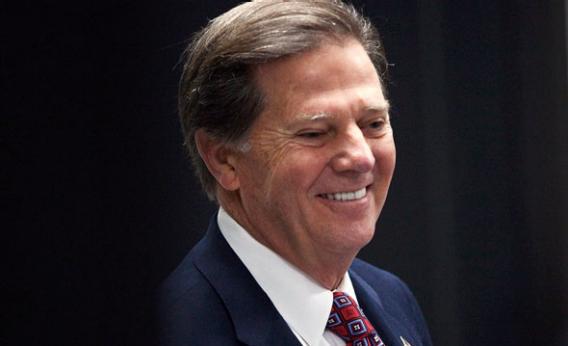Some liberals are no doubt disappointed to hear that a Texas appellate court today, on a 2-1 vote, reversed the conviction of former U.S. House Majority Leader Tom DeLay. They shouldn’t be. There were good reasons to think that DeLay’s prosecution in Texas for violations of state campaign finance law, like the federal prosecutions of former presidential candidate John Edwards and former Alabama Gov. Don Siegelman, involved politically motivated charges brought by overzealous prosecutors. Today’s ruling is a window into the world of corporate access to elected officials, for sure. But it confirms that the big problem is not what’s illegal, but what’s legal. Check this out: The appeals court saved Tom DeLay’s hide by concluding that corporations were giving money to get “face time” with him.
DeLay’s cherished goal when he was in office was to increase Republican power in the U.S. House of Representatives. One of his principal tactics was to get the Texas Legislature to redraw Texas’ congressional districts to gerrymander more Republican seats. To make sure he had the Republican majority he needed in the Texas Legislature, DeLay worked with a Texas political organization, Texans for a Republican Majority, or TRMPAC.
TRMPAC raised money from both individuals and corporations, advertising itself as “focused on raising and giving funds directly to Republican candidates for state house, state senate, and potentially all statewide offices.” The problem was that under Texas law, TRMPAC couldn’t use corporate money to support Texas legislative candidates. So the group swapped corporate money with an affiliate of the Republican National Committee in exchange for money from an RNC account made up of donations only from individuals. Those funds went to seven Republican legislative candidates. DeLay was convicted of charges stemming from this swap, which prosecutors termed “money laundering.”
On appeal, the legality of DeLay’s conviction turned on whether the donations the corporations gave to TRMPAC were illegal. The court reasoned that if the corporate donations were legal, then there would be no intent to engage in illegal money laundering to avoid the corporate contribution ban to candidates in Texas law. The corporations could have given the money, for example, knowing it could be legally transferred to other political organizations to be used for legal purposes. Then there would be no money laundering. Prosecutors pointed to the fact that TRMPAC solicited corporate funds to support candidates for state office while corporate officials knew the money could not be used for this purpose. But the appellate court said this couldn’t support the verdict. “The evidence at trial was that the corporations primarily gave money to TRMPAC to show their support of DeLay,” Justice Melissa Goodwin of the Texas Court of Appeals, Third District wrote for herself and Justice David Gaultney. “Most of the corporate representatives also testified they hoped to have the opportunity to have ‘face time’ with DeLay to discuss policy, educate him on the particular issues of concern, and build a relationship with him.”
Third District Chief Justice J. Woodfin Jones disagreed. He argued that unless the corporations specified that their funds could be used only for permissible purposes (such as supporting elections or ballot measures in other states), the contributions were illegal.
What’s most interesting about this judicial debate is the majority’s view of how corporate intent (how exactly can there be such a thing in the first place?) saved Tom DeLay. If the only evidence before the court showed that the corporations gave money to TRMPAC to support its goal of electing a Republican majority to the Texas legislature, then DeLay’s conviction might have stood. But because the corporations were giving large donations to secure access to DeLay, their motives were pure and DeLay’s conviction had to go.
It says much about the current state of our campaign finance system that it is perfectly acceptable for corporations to give large donations to gain access. In this, the Texas appeals court followed the Supreme Court’s lead in Citizens United, where the majority essentially dismissed the problem of corruption stemming from the sale of access. In the eyes of the majority, the corporations supporting Tom DeLay did nothing wrong. That may be the law, but it’s also a shame.
